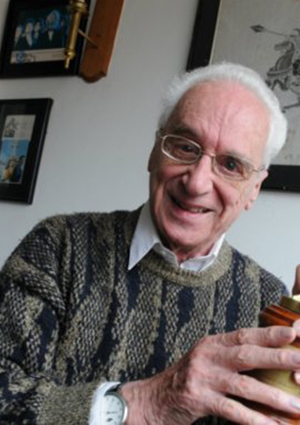Actor / Actress
Fausto Cabrera
Fausto Cabrera was born on October 4, 1924 in the Canary Islands, Spain. Like many Spanish intellectuals, he was a victim of the Franco regime and was forced to flee his native country. When he arrived in Colombia in 1946, he quickly became one of the pioneers of television in the country. President General Gustavo Rojas Pinilla commissioned Cabrera and Bernardo Romero Lozano to create the teleteatro, an initiative to adapt the great theatre classics to television, at a time when all TV was broadcast live.
President Rojas Pinilla’s request came after Cabrera opened his play Manuelita, la libertadora del libertador at the Teatro Colon. The play created enormous controversy in Colombian society over scenes that were described as “obscene,” and it was finally censored by the Ministry of Culture.
Cabrera worked for nine years at the Colombian national television network Televisora Nacional, where he founded the country’s first actors guild, which went on strike in the 1960s in defense of cultural programming on television. He later joined the communist party and the People's Liberation Army (EPL), leading him to live in the jungles of northwestern Colombia for three years, until he began to have serious disagreements with the guerrilla group’s actions and decided to go into exile in China.
As an actor, he had credits in the feature films A Matter of Honor(1988); The Strategy of the Snail (1993), one of his best known performances; Águilas no cazan moscas (1994); Ilona Arrives with the Rain (1996); Time Out (1998); and The Art of Losing (2004), all directed by his son Sergio Cabrera, one of Colombia’s preeminent filmmakers. He also had roles in the series El último beso (1992) and Julius (1999), as well as in the feature films La deuda (1997), by Nicolás Buenaventura and Manuel José Álvarez, and El gran sadini (2012), by Gonzalo Mejía.
In addition, Cabrera wrote the book Fausto Cabrera, experiencias y vivencias en el teatro, radio, cine, televisión, actor, director, libretista y guerrillero frustrado (Fausto Cabrera, experiences in theater, radio, film, television: actor, director, screenwriter, and frustrated guerrilla). His love of poetry and efforts to promote it are also widely remembered. Cabrera created the only TV program solely devoted to poetry that was broadcast on free-to-air television in the history of Colombian television.
He founded the Fine Arts Institute of Medellin, and created and directed the theater group of the Universidad Femenina de Medellin. He was married to Luz Helena Cárdenas, with whom he had two children, Sergio and Marinella. In 2004, the Ministry of Culture honored him with its Life and Work Award, for his contributions to the arts in Colombia.
Fausto Cabrera died on Monday, October 10, 2016 in Bogota, after a fight against a respiratory illness.
Last updated: October 2016.
Filming
Actor / Actress
EL GRAN SADINI (2014)
Actor / Actress
THE ART OF LOSING (2004)
Actor / Actress
GOLPE DE ESTADIO (1998)
Actor / Actress
Actor / Actress
ILONA LLEGA CON LA LLUVIA (1996)
Actor / Actress
ÁGUILAS NO CAZAN MOSCAS (1994)
Actor / Actress
LA ESTRATEGIA DEL CARACOL (1993)
Actor / Actress
TÉCNICAS DE DUELO (1988)


